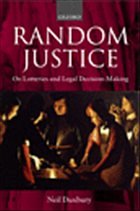Chance inevitably plays a role in law but it is not often that we consciously try to import an element of randomness into a legal process. Random Justice: On Lotteries and Legal Decision-Making explores the potential for the use of lotteries in social, and particularly legal, decision-making contexts. Utilizing a variety of disciplines and materials, Neil Duxbury considers in detail the history, advantages, and drawbacks of deciding issues of social significance by lot and argues that the value of the lottery as a legal decision-making device has generally been underestimated. The very fact that there exists widespread resistance to the use of lotteries for legal decision-making purposes betrays a commonly held belief that legal processes are generally more important than are legal outcomes. Where, owing to the existence of indeterminacy, the process of reasoning is likely to be excessively protracted and the reasons provided strongly contestable, the most cost-efficient and impartial decision-making strategy may well be recourse to lot. Aversion to this strategy, while generally understandable, is not necessarily rational. Yet in law, as Professor Duxbury demonstrates, reason is generally valued more highly than is rationality. The lottery is often conceived to be a decision-making device that operates in isolation. Yet lotteries can frequently and profitably be incorporated into other decision-frameworks. The book concludes by controversially considering how lotteries might be so incorporated and also advances the thesis that it may sometimes be sensible to require that adjudication takes place in the shadow of a lottery.
This controversial book explores the potential for the use of lotteries in social, and particularly legal, decision-making contexts. Utilizing a variety of disciplines and materials, the author considers in detail the history, advantages, and drawbacks of deciding issues of social significance by lot and argues that the value of the lottery as a legal decision-making device has generally been underestimated. The final chapter of the book considers how lotteries might be combined with other decision-mechanisms and suggests that it may sometimes be sensible to require that adjudication takes place in the shadow of the lottery.
This controversial book explores the potential for the use of lotteries in social, and particularly legal, decision-making contexts. Utilizing a variety of disciplines and materials, the author considers in detail the history, advantages, and drawbacks of deciding issues of social significance by lot and argues that the value of the lottery as a legal decision-making device has generally been underestimated. The final chapter of the book considers how lotteries might be combined with other decision-mechanisms and suggests that it may sometimes be sensible to require that adjudication takes place in the shadow of the lottery.

